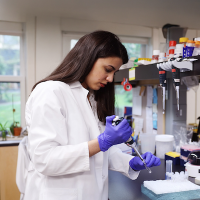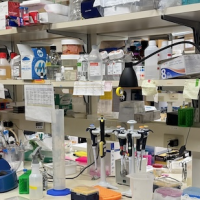
Along with blowing out your candles and treating yourself to that outfit you’ve had your eye on for months on end, your 25th birthday in the UK comes with an invitation from your doctor for your first pap smear. In the UK and US, patients will normally be invited for a pap smear every three years. However, medical professionals have highlighted that there’s been a drop in attendance over the last 18 months due to COVID-19. And if you have endometriosis, you may have additional reservations when it comes to your smear test.
Olivia is 27 years-old and was diagnosed with endometriosis a year and a half ago. She received her letter to attend her first cervical smear test a few months after her 25th birthday. “It triggered a really surprising reaction within me,” Olivia said. “I’m so aware of how important smear tests are and at that point, I was very used to going to the doctors and having to speak openly about my intimate health. But the thought of a doctor examining me really scared me. I feared that I’d have a chronic pain flare up and that I wouldn’t be aware of what was happening.”
It’s estimated that there will be almost 14.5 thousand new cases of invasive cervical cancer diagnosed in the U.S in 2021. Around 4,290 people will die from the condition. However, Jo’s Cervical Cancer Trust, a leading cervical cancer charity, writes that screenings prevent over 7 in 10 diagnoses. If you’re at all concerned about attending a cervical cancer screening, here are some things you can consider.
What happens at a smear test and why may it be painful?
They say that knowledge is power so preparing yourself for what will actually happen during your screening may help you feel more in control, able to ask questions, and open up a conversation between yourself and your doctor.
Smear tests don’t test for cancer but they are a great preventative step in monitoring your health. Jo’s Cervical Cancer Trust explains that when you call to book your appointment at your clinic you should make it clear to your doctor and any support staff that you have endometriosis and experience chronic pain. It’s their job to explain the process of the examination so you have enough information to make an informed decision about whether to continue.
Once arriving at the clinic they should be able to answer any questions that you have and the examination will begin when the doctor inserts a speculum into your vulva. They’ll brush across your cervix to collect a sample of cells to send off to be tested.
The test is looking for human papillomavirus (HPV) infection or abnormal cervical cell changes which, if left unmonitored, could develop into cervical cancer.
Your smear test shouldn’t be painful. However, for people with endometriosis, it can trigger pain and irritation. This is because the condition may have caused inflammation in your pelvis. The speculum may irritate this. Olivia also explains that much of the pain and irritation of her first smear test came before she walked into the examination room.
“After spending the last decade in and out of doctors waiting rooms, trying to describe my chronic pain and either not being understood or not being listened to, the prospect of having an internal examination scared the life out of me,” she said, “My anxiety triggered a flare-up and by the time I was sat in the clinic, I was close to tears. I associate so much trauma with this area of my body so I was battling myself because I knew having my smear test was so important.”
You’re the one in control
The crucial thing to remember when you enter your doctor’s office for your smear test is that you’re the one in control and nothing should happen without your full consent. If this means that your doctor spends a period of time before the examination detailing exactly what they’ll do or you put a pause on your examination halfway through, then that’s totally fine and normal.
“One of the only good things about being so accustomed to explaining my pain and endometriosis to doctors is that I already had the language to outline how I was feeling during my appointment,” said Olivia. “I’m not shy about advocating for myself anymore and the examination itself was nowhere near as daunting or uncomfortable as some of the procedures I experienced before I was diagnosed.”
25-year-old Seren attended their first smear test two months ago. Like Olivia, they were diagnosed with endometriosis two years ago and were left worried about how their smear test would affect the pain they experience. “I’m a pro at researching medical procedures and their side effects at this point so I searched the internet for the stories of people like me, who have endometriosis and have been for their smear test,” they said, “sometimes you just need to hear from someone else similar to you that it’s okay.”
Things to do before your appointment
Alongside making your clinician aware of your endometriosis diagnosis, establishing exactly what happens during the exam, and remembering that you’re in the driving seat throughout, there’s a number of practical things to consider before your smear test—namely how some of your side effects may impact the test.
Irregular bleeding is a common symptom associated with endometriosis. If on the day of your examination, you begin to bleed, then you will need to reschedule your screening. SH:24, a sexual health organization that works in partnership with the NHS, outlines that during your test your doctor will want to try and achieve the clearest results they possibly can. Blood cells can make this more difficult.
Similarly, if you’re experiencing a bad pain day, don’t feel obliged to force yourself to the appointment. Ensure that your medical team understands your diagnosis, the side effects that come with it, and any trauma that you’ve experienced in the past in a medical setting.
“I rescheduled my appointment twice before going in for my screening,” Seren said. “On the first date my pain was debilitating, and on the day of my second appointment, I couldn’t shake the fear that the test would come back positive and I would have another medical diagnosis to contend with. The fact that my doctors gave me extra time to answer all of my questions and were sympathetic to my diagnosis made a world of difference.”









